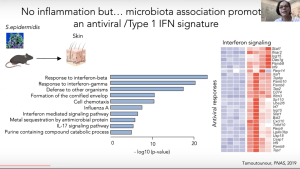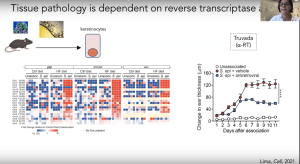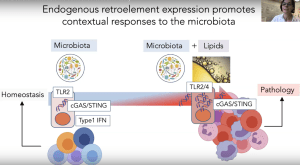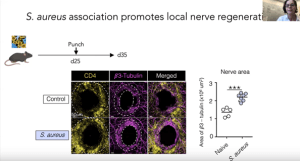Recently were privileged to listen to a webinar by Dr. Yasmine Belkaid titled, “Microbiome control of host immunity.”
Dr. Yasmine Belkaid is a distinguished Investigator at the National Institute of Allergy and Infectious Diseases at the National Institute of Health (Bethesda). She obtained her Master at USTHB in Algeria and her Ph.D. from the Pasteur Institute in France. Following a postdoctoral fellowship at the National Institute of health (Bethesda) on immune regulation during infection, she started her research program at the Children’s Hospital Research Foundation in Cincinnati. In 2005, she joined the National Institute of Allergy and Infectious Diseases (NIAID) and was appointed senior scientist in 2008. Her laboratory explores fundamental mechanisms that regulate tissue homeostasis and host immune responses and uncovered key roles for the microbiota and dietary factors in the control of immunity and protection to pathogens. Dr Belkaid also holds an appointment at the University of Pennsylvania and is the director of the trans NIH Center for Human immunology. She is the founder and Director of the NIAID Microbiome program. Dr Belkaid is a member of the National Academy of Sciences, the American Academy of Arts and Sciences, the National Academy of Medicine and recipient of numerous awards including the Lurie Prize in Biomedical Sciences, the AAI-Thermo Fisher Meritorious Career Award, the Emil von Behring Prize, and the Sanofi-Institut Pasteur Award.
In her presentation, Dr. Belkaid spoke about the role of microbiota in tissue immunity and repair, highlighting early how the microbiota control the development and function of the immune system. She highlighted work done in her lab whereby they showed how skin microbiota-specific T cells promote antimicrobial defense and tissue repair. This study was furthered by more groups as seen in Figure 1. Following numerous studies, Dr. Belkaid and her lab decided to look further into the relationship of the microbiome immunity and endogenous retroviruses (ERV). In short, utlising S. epidermis, they were able to show that tissue pathology is dependent on reverse transcriptase (RV) activity and that there is a relationship between RV activity, the microbiome and ERV activity (Figure 2).
Moving on, the lab was able to establish that ERV expression is required for responses to skin commensals and that a multikingdom dialogue control exists to control immunity to microbes (Figure 3). Interestingly, she showed how there is a link between diet, genetics, and infection to immunity to microbiota. Elaborating on diet, Dr. Belkaid explained how diet has a profound impact on the immunity to microbiota through its effects on ERV activity.
Dr. Belkaid continued to highlight how the microbiome manipulates the immune system to maintain homeostasis. She highlighted a role of S. aureus, and how we maintain an important balance of coexistence with this microbe. In short, she showed how the microbe can prepare the body and immune system for tissue damage and or tissue repair (Figure 4).
A lovely and complicated talk which can be view on the IUIS website. The talk was followed by a very interesting discussion.
Summary by Stefan Botha














